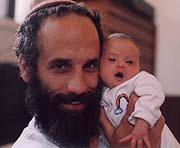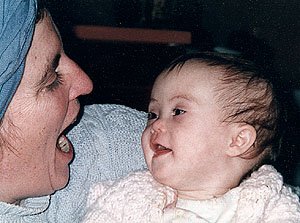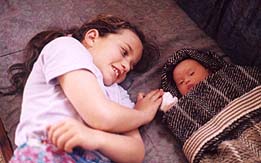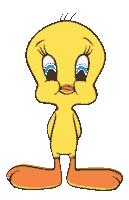 Welcome to all, and thank you for coming, after a sleepless night, to celebrate with us the birth of the long-awaited daughter for the Gilbar family.
Welcome to all, and thank you for coming, after a sleepless night, to celebrate with us the birth of the long-awaited daughter for the Gilbar family.
Laivav Shabat.
 Welcome to all, and thank you for coming, after a sleepless night, to celebrate with us the birth of the long-awaited daughter for the Gilbar family.
Welcome to all, and thank you for coming, after a sleepless night, to celebrate with us the birth of the long-awaited daughter for the Gilbar family.
Our daughter was born on the 13th day of the Counting of the Omer, the period between Pesach and Shavuot, the day that is called "Yeshod Sh'B'Gvura, the Foundation of Strength. To the extent that I understand what that means, it is the characteristic of expressing truth and justice without exaggerations or embellishment. The word Yesod is related to Sod, Secret, and our first thought for a name was 'Sod,' or, Yayin, wine, which is connected to Sod. But maybe, before I go into her name, after 7 children, 4 of whom were born and received their special names in Shilo, the time has come to explain how we give our children names.
The Ari z"l says that every parent is given a degree of prophecy at the time he names his child. We prepare ourselves for this moment, and this time a bit with the other children, by dedicating some thought to what meaning we want to pass on to this child, in addition to wondering what the child seems to bring to the world. Sometimes this relates to events in our lives, and sometimes to our hopes for our or their future.
This girl, for instance, with her special syndrome, according to all the stories we heard from people who were familiar with Down, would have a special connection to the heart. They say that people with Down are very direct, lacking the masks and obstacles that most people use to manage their lives. Instead, they connect straight from the heart. Yesod ShB'Gvura, Direct Strength. So we began to think about the heart, and everything connected to the heart. Joy of the heart, Straight from the heart.
The next thing we do, once we have some ideas to work with, is to pour over anything which is read close to the time of the birth. Starting with prayer, daily, or special things that we say for nearby events, such as Counting the Omer, as well as Tora readings. The month of Iyar started shortly after her birth, and we looked into Barchi Nafshi, from Tehillim, with wine and bread on our minds. There we say:
Now as I read this, the word Laivav (heart) jumps out at me. But for us sometimes prophecy warms up slowly. We were still looking for a connection to Yesod ShB'Gvura, and I thought we had found it. Here was our Sod, and here was our Wine, which, in gematriya, is Sod, secret. I thought the idea of wine, of hidden secrets which are slowly revealed, of quiet strenght, could easily represent our daughter.
I have always been attracted to "shailot Yesod", to basic questions. They are the key to truth and understanding. By virtue of coming from a different culture, and attempting to explain my way of life to others still there, we continually face these questions. How do you explain why you believe in God? That marriage is holy? That a large family is a godly thing? Considering these questions brings a person to understand themself better, and therefore to a better understanding of God. Laivav Shabat arouses questions, and this, I think, will bring us to new heights, to questions, and to deeper understanding. To know God.
But sticking with Sod meant abandoning bread, an idea which has fascinated me for years. Bread is so fundamental a part of life, and is treated with a respect beyond what one would expect for mere food: We say the blessing Bircat HaMazon only over bread, many of the things we avoid on shabat are based on the process of making bread, it's the same root in Hebrew as war, of all things, and Rashi considers it even more in connection with Yosef in Potiphar's house in Egypt. And here suddenly we're offered a golden opportunity to use it for our child's name?! So we thought, bread and wine, what could represent both of them together? Simple: Shabat (sabath)!
 Now bells were really beginning to ring. First of all, she's our seventh child. A child who will be fundamentally different than her 6-days-of-the-week brothers and sister, whose influence on the world may be reflective, passive, rather than active. An existence of presence, rather than push. The very essence of Shabat!
Now bells were really beginning to ring. First of all, she's our seventh child. A child who will be fundamentally different than her 6-days-of-the-week brothers and sister, whose influence on the world may be reflective, passive, rather than active. An existence of presence, rather than push. The very essence of Shabat!
The Ibn Ezra asks why Adam was created after all other creations. One of his answers is that Adam walked into a completely prepared situation. The feast was waiting and ready. Into the garden, and boom, here comes Shabat. I thank God that he gave us this little girl now, once we have a functioning family, ready to take on challenges. I have a hard time imagining what would have happened had this been our first child. Today the feast is ready.
When we decided that the name 'Shabat" was fitting, we checked back with our original ideas. We had wanted something that reflected the idea of Heart. Shabat is close to my heart, but there's no direct connection, and it made no sense to give a roundabout name when you're trying to communicate the idea of directness. The week she was born we read the second chapter in the Mishna Pirkei Avot (Sayings of the Fathers). There it says that the best path for a person to take is that recommended by Elazar ben Shatach, because his path includes all the good paths. And what is his system? Lev Tov, a good heart.
So, with her in mind, we returned to the straight and narrow, and went straight for the heart. But we noticed that Lev, seldom appears in tefila. Much more frequent is Laivav. You should love the lord your God, with all your heart (laivav)(Devarim 6,4) . And, as mentioned before,
Wine to make man's heart (laivav) happy, ... bread to make man's heart (laivav) shine. I think there's a difference between the Amidah and Shema. The Amida is a list. Lists by their nature are connected to the head, to intellect. Shema is connected to the heart, it's full of love, heart, and desire. In the bracha before shema we say:
As God loved our fathers, as you taught them to do your will belaivav shalem, with a complete heart, so you should teach us.
 Rav Dov (of Shilo) explained to me that the idea of Laivav, instead of Lev, the simpler word for heart, is the natural double-nature of the heart. A heart has two sides, two chambers. People have dual nature, an inclination to good, and to evil. It is something I only begin to understand, but to praise God when you receive a wonderful healthy child, while noble, does not demand all that much from a person. The rabbis teach that we thank God for the bad, as well as the good. Laivav was born with an extra chromosome, and she will be different than the children we have gotten used to, different from the girl we had dreamed of. We have gone through a lot since Laivav was born. It is hard to know what 'bad' means when you accept everything as coming from God. Initially, there was a sense of loss. Then the awareness that this was a special something, loaded with happiness, and there was no reason for sadness. One friend told us that in God's eyes, we are all nothing more than happy smiling children. Who amongst us is wise, is clever, before God? I don't know that we will be able to understand exactly the what and the why, but to thank God for her, that we are capable of. God willing, we will be able to do that, not just today, but all our lives. The funny thing is, everyone who is on the other side of the fence, who knows people with extra chromosomes, tells us that it is a wonderful gift, an incredible addition to the family.
Rav Dov (of Shilo) explained to me that the idea of Laivav, instead of Lev, the simpler word for heart, is the natural double-nature of the heart. A heart has two sides, two chambers. People have dual nature, an inclination to good, and to evil. It is something I only begin to understand, but to praise God when you receive a wonderful healthy child, while noble, does not demand all that much from a person. The rabbis teach that we thank God for the bad, as well as the good. Laivav was born with an extra chromosome, and she will be different than the children we have gotten used to, different from the girl we had dreamed of. We have gone through a lot since Laivav was born. It is hard to know what 'bad' means when you accept everything as coming from God. Initially, there was a sense of loss. Then the awareness that this was a special something, loaded with happiness, and there was no reason for sadness. One friend told us that in God's eyes, we are all nothing more than happy smiling children. Who amongst us is wise, is clever, before God? I don't know that we will be able to understand exactly the what and the why, but to thank God for her, that we are capable of. God willing, we will be able to do that, not just today, but all our lives. The funny thing is, everyone who is on the other side of the fence, who knows people with extra chromosomes, tells us that it is a wonderful gift, an incredible addition to the family.
Rebbe Nahman of Braslav said: When you reach something difficult, there are those who say that you have stumbled, that you have fallen, but that's not so he says. Picture a stack of records, onan old-time record-player. When you reach the core of one, when you've conquered, completely mastered the level you are on, you go up a level, to the next record. And where do you begin? On the outside, the klipot, the most external layer. But it means, in God's eyes, you were ready for the next challenge. God willing we will have the understanding always to see that this is from God, to rejoice and be happy in it.
Like any good prophecy, the proof from above was not long in coming. The day after we decided, I went to Shilo's Yom HaAztmaut ceremony, which concluded, of course, with the singing of Hatikva. The first line is : as long as deep in our hearts there remains a Jewish soul, yearning, hoping.
And so Laivav Shabat was born, with her special characteristics, and with her name. What I have lerned up till now leads me to believe that she is likely to have an enormous effect, not just on the Gilbar family, but on the entire community. You have been forewarned.
 I hope that we will able to continue to say that which we say every morning when putting on a talit:
I hope that we will able to continue to say that which we say every morning when putting on a talit:
How precious is your kindness, o God, man takes refuge in the shadow of your wings. May they be sated with the abundance of your house, and may you give them
drink from the stream of your delights. With you is thesource of life, in your light we see light. Extend your kindness to those who know you, and righteousness to the true of heart. (Psalms 36, 8-11)
Thank you all for coming, for your wonderful support, sit back and enjoy the show.!
She's too young to talk back (hah), but you can still write to for kicks.
| Back to the Kids | Back to Square One |